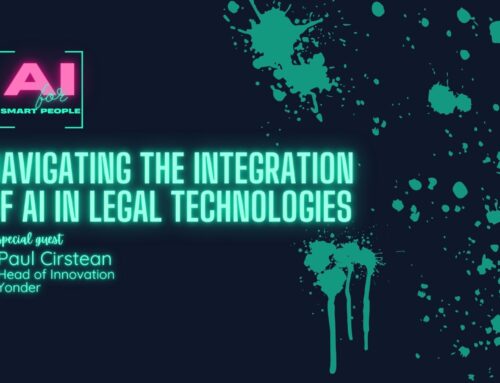Setting the Foundation: Speaking the (Large) Language (Model)
In the debut episode of the “AI for Smart People” podcast, hosted by Cheryl Wilson Griffin, Dr. Megan Anzelc and Christina Fernandes-D’Souza from Three Arc Advisory provided an enlightening discussion on the foundational concepts of artificial intelligence (AI). This session aimed to demystify AI for legal professionals and set the stage for more advanced topics in subsequent episodes. Here are the key insights from their discussion.
The Evolution and Impact of AI
AI’s journey is not as recent as many might think. As Megan highlighted, the roots of AI can be traced back to ancient times, with early automation concepts dating back to 250 B.C. Modern AI, however, gained momentum in the last 50 years. AI’s development has been significantly driven by advances in data volume and computational power. This combination has enabled complex algorithms to learn from vast amounts of data, making AI applications more practical and widespread.
The Importance of Compute Power
Cheryl emphasized the transformative role of increased compute power. She pointed out that advancements in computational capabilities have turned once-conceptual ideas into practical tools. This leap means that AI can now handle more complex tasks efficiently, opening up new possibilities for applications across various industries, including legal.
Key Terms and Concepts
Understanding AI requires familiarity with some foundational terms:
- Artificial Intelligence (AI): A broad term for machines designed to think and act like humans.
- Machine Learning (ML): A subset of AI focused on algorithms that learn from and make predictions based on data.
- Generative AI: A newer area of AI that creates new content, such as text or images, from existing data.
These concepts are crucial for grasping how AI can be integrated into various industries, including legal practice.
Why Now? The Role of Data and Compute Power
The surge in AI’s capabilities is largely due to the availability of large datasets and significant computational power. As Cheryl noted, this technological leap means that ideas once considered conceptual can now be realized. This shift has opened up new possibilities for AI applications across industries.
Practical Applications of AI
Megan and Christina discussed how AI is already embedded in many industries:
- Insurance: AI algorithms have automated the underwriting process for personal lines of insurance, such as auto and home insurance.
- Marketing: AI drives targeted advertising and customer segmentation, enhancing marketing strategies.
- Legal: While still emerging, AI in legal practices holds promise for tasks like document summarization, data normalization, and internal process automation.
AI in Legal Practice
Cheryl added that even though AI’s presence in legal practices is still developing, its potential is immense. She emphasized that AI can transform routine tasks, making legal work smarter and more efficient. For example, AI can significantly reduce the time spent on document review and data extraction.
The Importance of Prompt Engineering
One critical aspect of working with AI, especially generative AI, is prompt engineering. Christina explained that prompt engineering involves crafting and optimizing instructions given to AI models to achieve the desired outcomes. This can range from simple tasks, like sentiment analysis, to more complex ones, such as document classification.
Reinforcement Learning and Ethical Considerations
Reinforcement learning, a type of machine learning where an agent learns by trial and error, plays a significant role in fine-tuning AI models. Christina used the example of training a model to classify movie reviews by sentiment, showing how incremental feedback improves accuracy. This process is essential for ensuring that AI outputs align with ethical standards and do not produce harmful or misleading results.
Preparing for AI Adoption
For organizations considering AI adoption, it’s crucial to start with a clear strategy aligned with business goals. Megan emphasized the importance of identifying the problems AI can solve and planning for data management and change. Cheryl noted that it’s essential for firms to understand the capabilities and limitations of AI, ensuring they are prepared for the technological shift.
Conclusion
The “AI for Smart People” podcast episode with Cheryl, Megan, and Christina laid a strong foundation for understanding AI’s role in modern industries. By demystifying core concepts and emphasizing the importance of strategy and ethical considerations, they provided legal professionals with the knowledge to start their AI journey. As AI technology continues to evolve, staying informed and proactive will be key to leveraging its full potential in legal practice and beyond.
This foundational knowledge sets the stage for more advanced discussions in future episodes, helping legal professionals navigate the rapidly changing landscape of AI technology.



